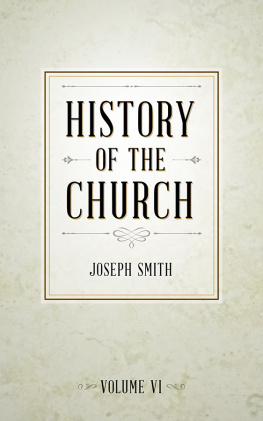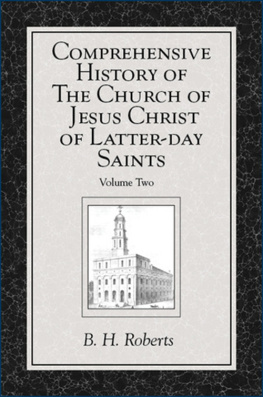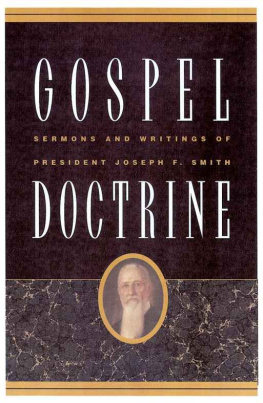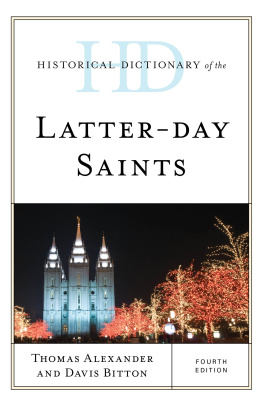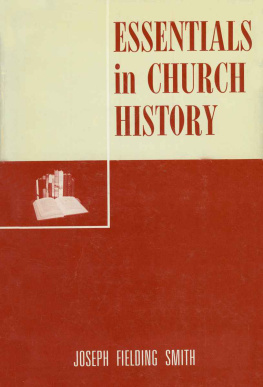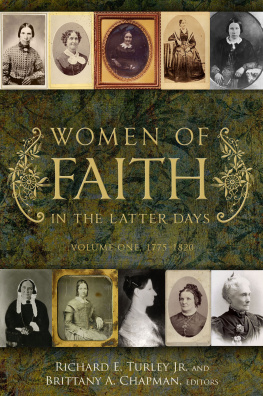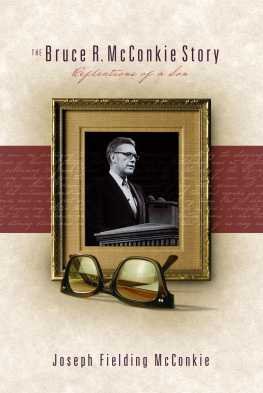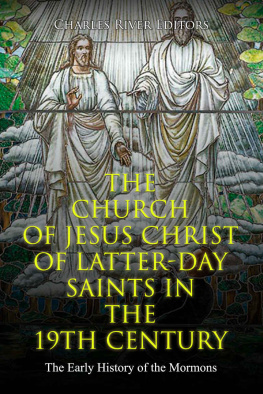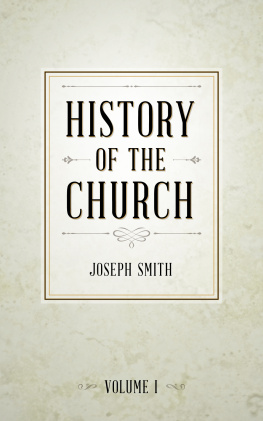Mary Fielding Smith, Daughter of Britain: Portrait of Courage
Don Cecil Corbett
1966 Deseret Book CompanyAll rights reserved. No part of this book may be reproduced in any form or by any means without permission in writing from the publisher, Deseret Book Company, P.O. Box 30178, Salt Lake City, Utah 84130. This work is not an official publication of The Church of Jesus Christ of Latter-day Saints. The views expressed herein are the responsibility of the author and do not necessarily represent the position of the Church or of Deseret Book Company.Deseret Book is a registered trademark of Deseret Book Company.
Publisher's Preface
As The Church of Jesus Christ of Latter-day Saints approaches the one hundred fiftieth anniversary of the arrival of the pioneers into the Salt Lake Valley, it is appropriate that attention is once again focused on one of the heroines of that courageous and faith-filled body of Saints. Mary Fielding Smith exemplified the character traits that made those pioneers so magnificent. She, like many others, was a woman of faith, determination, and courage who endured hardships unimaginable when judged by the comforts of today's standard of living.
But Mary's difficulties and trials did not commence with her pioneer experiences. From the day she was baptized into the restored church, she faced constant challenges; yet her faith never wavered. Perhaps the resoluteness of her determination to endure might be summarized in words extracted from one of her letters: "Blessed be the God and Rock of my salvation, here I am, and am perfectly satisfied and happy, having not the smallest desire to go one step backward." Her faith and commitment to follow the counsel of the Lord and his servants stand in sharp contrast to another significant woman of history who, contrary to divine admonition, "looked back" and lost her life. (See Genesis 19:17-26.)
Yet combined with Mary's desire to be obedient and her ability to follow counsel was a fierce independence. This was aptly demonstrated during her confrontation with Peter Lott, the cantankerous captain charged with leading her and others from their camp in Winter Quarters, Nebraska, to the Rocky Mountains. Told by the insensitive man that she, a widow with scarce resources, would be "a burden" upon the little company of pioneers "the whole way," Mary resolutely replied, "I will beat you to the valley and will ask no help from you either!"
Such was the faith and determination of Mary Fielding Smith that she kept her word, beating not only the captain but also the entire company into the valley by many hours. However, her promise was not easily kept. There were many challenges during the long trek across the plains that might have stopped one of lesser spiritual strength.
One such challenging experience was the occasion when one of her oxen, evidently spent of its strength, simply lay down in the dirt and appeared to die. Ignoring the caustic comments of her nemesisthe company's captainMary returned to her wagon to retrieve a healing remedy: a bottle of consecrated oil. She asked her brother Joseph Fielding and another worthy priesthood bearer to anoint and administer to the fallen beast. The Lord responded to Mary's silent prayers and the pleading of two humble bearers of his priesthood. To the amazement of those who watched this strange but sacred event, the animal rose to its feet and the journey continued.
Later, yet another ox of Mary's similarly dropped in the dust devoid of life, and the divine drama was repeated as a priesthood blessing restored its life.
What were the origins of the strength of this special woman, Mary Fielding Smith? As the title of this book declares, she was a daughter of Britain. Mary was raised in a religious family in England, and her parents cultivated in her a faith in and love of God. She was raised in the countryside on a small farm where she loved the animals and knew the meaning of hard work. Mary also learned the graces for which the English are noted and developed a finely tuned sense of dignity and culture.
Her dignified charm did not go unnoticed by men. One such was a gentleman whose interest in Mary was not reciprocated. Not feeling good about his pursuit of her, Mary decided to emigrate to Canada. The spurned suitor was a lay preacher in a Protestant faith, and Mary's departure was looked upon by some as providential for him, leaving him more time to devote to his ministry. How little did the well-meaning detractors realize how providential such a decision really wasbut on Mary's part; for God had other plans for this daughter of Britain. Surely she stood among the great and noble women in premortal councils who received special appointments in this life.
This marvelous woman was to become the wife of Hyrum Smith, the patriarch-prophet, and the mother and grandmother of yet other prophets of God. Her impact upon the history and destiny of the Lord's latter-day work is well expressed by Susa Young Gates in a tribute written in 1915: "When the roll of the greatest women of modern times is called, we make no doubt that the name of Lucy Mack Smith will head that roll. The second name on that list will be that of Mary Fielding Smith.... Her greatness, her power, her beauty and her charm have lain hidden in the modest silence and reserve with which she covered all her own acts. But the pages of history will yet record what she was, what she did and why she is entitled to this exalted rank." ("Mothers in Israel," Relief Society Magazine, 3 [March 1916]:123.)
As a relatively new convert to the Church, Mary was immediately exposed to turmoil that tried the faith of many. Shortly after her baptism in Canada, she traveled to Kirtland, Ohio, headquarters of her newfound faith. At this time, apostates were speaking against the Prophet Joseph Smith, seeking to wrest control of the Church. Mary was undaunted. In a letter to her sister, she said, "I do thank my Heavenly Father for the comfort and peace of mind I now enjoy in the midst of all the confusion and perplexity and raging of the devil against the work of God in this place."
During the seventeen years she lived from the time of her baptism until the time of her death, Mary Fielding Smith would experience much of the devil's raging against the work of God in many places. She was driven from the comforts of her home on numerous occasions. She watched her saintly husband ill-treated and finally martyred by rabble.
Perhaps as she viewed the mutilated and lifeless body of her beloved husband, Hyrum, words she had earlier written gave her some degree of comfort: "I feel more and more convinced that it is through suffering that we are to be made perfect, and I have already found it to have the effect of driving me nearer to the Lord."
Such was the character of Mary Fielding Smith, whose earthly life is portrayed in this engaging volume written by one of her faithful descendants, Don C. Corbett. This gifted writer has added a human dimension to historical fact. He paints word pictures, adding color to black and white pages. As noted on the cover jacket, "Here is a biography that will stimulate and interest her countless descendants and all who seek inspiration from the lives of great individuals."
The life of Mary Fielding Smith has inspired speakers, teachers, painters, and historians. Famed Latter-day Saint artist Minerva Kohlhepp Teichert painted a masterpiece depicting Mary's faith and struggles. A building on the campus of Brigham Young University was dedicated to Mary Fielding Smith's memory in 1954. Yet no painting, building, or monument will ever sufficiently honor her. More lasting than these is the model of faith, courage, and determination engraved on the hearts and in the minds of those who have come to know of her good works.


